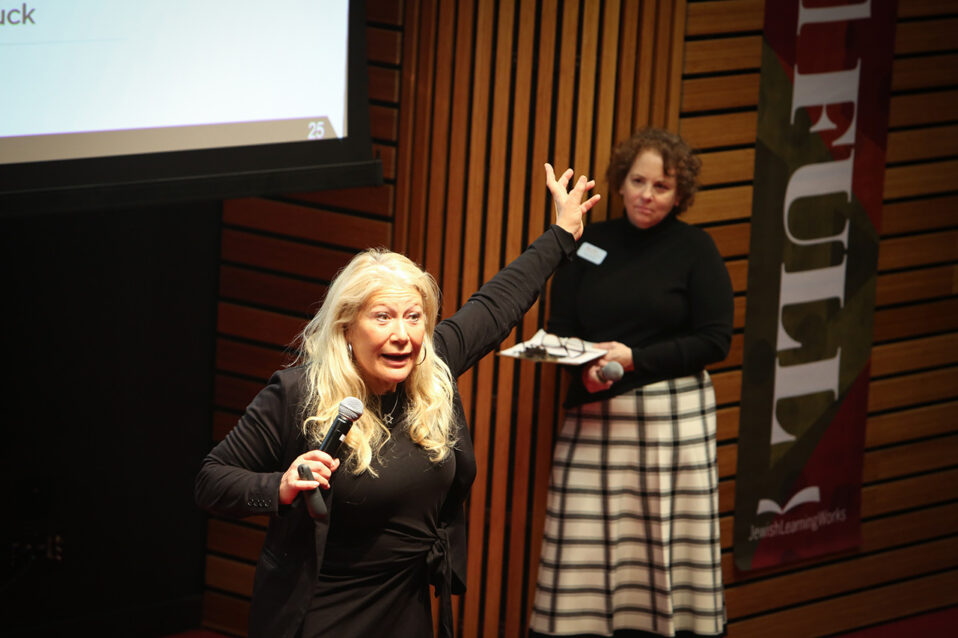By Alisha Pedowitz, Jewish LearningWorks’ Senior Educator. Originally posted on J.
Jewish educators have at our fingertips a powerful antidote that helps mitigate the impacts of the epidemic of despair and loneliness plaguing our society: spirituality.
That was my main takeaway from the keynote talk at SoulFull, a conference hosted by Jewish LearningWorks that drew close to 100 Jewish educators from across the Bay Area to Berkeley on Feb. 6.
As someone who has worked in the field of Jewish education for over 20 years and attended countless conferences on Jewish education, it was refreshing to have our day begin with a keynote on neuroscience. Attendees sat with rapt attention as Dr. Lisa Miller of Columbia University, author of “The Awakened Brain: The New Science of Spirituality and Our Quest for an Inspired Life,” showed us slides of neuropsychology data and explained her latest research on the neuroprotective impact of spiritual experiences.
Miller’s research demonstrates that spiritual experiences — those which strengthen the sense that life is sacred and rich with meaning and which cultivate relationships with the self, one’s community and God — are critically important in countering the mental health crisis that impacts a majority of American adolescents. In recent years, the U.S. surgeon general, the American Academy of Pediatrics and the American Psychological Society have all highlighted the dramatic rise in depression, anxiety and suicidal ideation. Over 50% of all adolescents meet the criteria for at least one of these, per the Centers for Disease Control Youth Risk Behavior Survey.
In many Jewish educational settings, the focus has been on seeing educators as first responders, with training to identify mental health red-flag behaviors and refer students to appropriate resources and to incorporate proactive interventions into educational practices. Jewish LearningWorks, for example, has offered programs such as Youth Mental Health First Aid certification (helping to certify close to 350 educators since 2021), as well as regular workshops with experts on topics including trauma- and grief-informed pedagogy and cultivating emotional and social health, all through the lens of Jewish education.
Miller’s research points to a new way of addressing this crisis. She sees it not as a crisis at the individual level, but as a crisis of the public sphere. In her view, that crisis should be understood as a spiritual one. In former Surgeon General Vivek Murthy’s “Parting Prescription for America,” he called the eroding sense of community a key factor in the “epidemic of diseases of despair.” His prescription is to build community through “relationships, service, and purpose,” which is essentially a framework for the spiritual experiences that Miller’s research points to — a framework that Judaism can provide.
According to Miller, communal spiritual experiences literally strengthen the pathways in the brain that make it more resilient in the face of depression and prime it to find sources of hope and support when needed most. She speaks of using Jewish language and tradition to help young people not only ascribe meaning to daily lives, but to provide them with ways of feeling “loved, held, guided and never alone.”
During her talk, I was reminded of being a teenager at Jewish camp, as our camp rabbi was leading a discussion on the idea that God is the “still, small voice inside of us.” The rabbi invited us each to fully wrap ourselves in a tallit like a cocoon and stand in that stillness. I remember being aware of the other people around me, while also experiencing the “still, small voice” in a way I never had. It was profound: Is this what prayer, and God, can feel like?
My focus turned deeply inward while my awareness was attuned to the community around me. I felt “loved, held, guided and never alone” — priming my brain for similar experiences moving forward. That moment still influences the way I pray, as I seek both to feel held by the community and to look for guidance in navigating challenges. This is the kind of profound experience that I try to bring to all my students.
Miller’s message was a balm for the souls of a community of educators who feel depleted from trying to buoy their communities through multiple years of crises. Recently, as Jewish LearningWorks has responded to the needs of our community, we have navigated a barrage of threats to young people’s social-emotional development and mental health. Every day, the young people we work with grapple with the pandemic’s lingering effects, the Oct. 7 attack and Israel’s reponse, antisemitism in schools, polarized conversations about Israelis and Palestinians, the climate crisis and other existential fears. The list goes on and on, and educators are wondering if we are doing enough.
That is why this year, Jewish LearningWorks launched the Bay Area Jewish Youth Resilience Roundtable, a group of professionals representing 13 local organizations who sit at the intersection of adolescent mental health and meaningful, spiritual Jewish youth programs. Together, we are exploring how we can use the spiritual framework of Judaism to cultivate resilience for our students. We invite all Bay Area organizations or professionals concerned about adolescent wellness to join us. If this is a crisis of the public sphere, then we have the collective responsibility — and wisdom — to respond.



